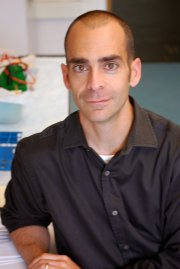 EUGENE, Ore. -- (March 26, 2009) -- University of Oregon biologist Joseph W. Thornton is among 50 early career scientists from 33 U.S. institutions named to each receive $1.5 million for six years of research under a new initiative announced by the Howard Hughes Medical Institute.
EUGENE, Ore. -- (March 26, 2009) -- University of Oregon biologist Joseph W. Thornton is among 50 early career scientists from 33 U.S. institutions named to each receive $1.5 million for six years of research under a new initiative announced by the Howard Hughes Medical Institute.
HHMI will provide each early career scientist with his or her full salary, benefits and research budget throughout the appointment period. The institute also will cover other expenses, including research space and the purchase of critical equipment. The support, according to the HHMI announcement, is designed to provide "the freedom to explore his or her best ideas without worrying about where to find the money to fund those experiments."
Thornton, a professor of biology in the UO Center for Ecology and Evolutionary Biology, has resurrected proteins more than 400 million years old to understand how today's hormones and their receptors evolved. He uses advanced biochemical and computational techniques to identify the genetic mutations by which ancient hormone receptor proteins took on modern-day functions. Thornton has also used X-ray crystallography to determine the atomic architecture of primordial receptors, revealing how their structures changed as they evolved the ability to bind new hormones.
The 41 men and nine women named will begin their nonrenewable appointments to HHMI in September. The institute anticipates a second Early Career Scientist competition in 2012.
"We saw a tremendous opportunity for HHMI to impact the research community by freeing promising scientists to pursue their best ideas during this early stage of their careers," said HHMI President Thomas R. Cech in a news release. "At the same time, we hope that our investment in these 50 faculty will free the resources of other agencies to support the work of other outstanding early career scientists."
In March 2008, HHMI unveiled its new Early Career Scientist program and announced a nationwide competition seeking applications from the nation's best early career scientists. The initial winners came from more than 2,000 applicants.
The Howard Hughes Medical Institute, a nonprofit medical research organization based in Chevy Chase, Md., is one of the nation's largest philanthropies. In the past two decades HHMI has invested more than $8.3 billion for the support, training and education of the nation's most creative and promising scientists. HHMI's principal mission is conducting basic biomedical research, which it carries out in collaboration with more than 60 universities, medical centers and other research institutions throughout the United States.